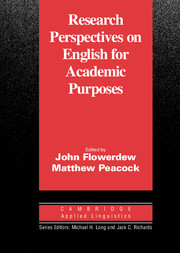Book contents
- Frontmatter
- Contents
- List of contributors
- Series editors' preface
- Preface
- I ISSUES IN ENGLISH FOR ACADEMIC PURPOSES
- Introduction to Part I
- 1 Issues in EAP: A preliminary perspective
- 2 Language use, language planning and EAP
- 3 EAP-related linguistic research: An intellectual history
- 4 Linguistic research and EAP pedagogy
- 5 International scientific English: The language of research scientists around the world
- 6 Discipline specificity and EAP
- 7 World Englishes: Issues in and from academic writing assessment
- 8 Addressing issues of power and difference in ESL academic writing
- 9 ‘I'll go with the group’: Rethinking ‘discourse community’ in EAP
- 10 EAP assessment: Issues, models, and outcomes
- II THE ENGLISH FOR ACADEMIC PURPOSES CURRICULUM
- References
- Index
7 - World Englishes: Issues in and from academic writing assessment
Published online by Cambridge University Press: 05 October 2012
- Frontmatter
- Contents
- List of contributors
- Series editors' preface
- Preface
- I ISSUES IN ENGLISH FOR ACADEMIC PURPOSES
- Introduction to Part I
- 1 Issues in EAP: A preliminary perspective
- 2 Language use, language planning and EAP
- 3 EAP-related linguistic research: An intellectual history
- 4 Linguistic research and EAP pedagogy
- 5 International scientific English: The language of research scientists around the world
- 6 Discipline specificity and EAP
- 7 World Englishes: Issues in and from academic writing assessment
- 8 Addressing issues of power and difference in ESL academic writing
- 9 ‘I'll go with the group’: Rethinking ‘discourse community’ in EAP
- 10 EAP assessment: Issues, models, and outcomes
- II THE ENGLISH FOR ACADEMIC PURPOSES CURRICULUM
- References
- Index
Summary
Introduction
The purpose of this paper is to study the implication of the World Englishes issue in academic writing assessment through a small scaled investigation of how raters' judgements of Chinese EFL student writers' examination essays interact with their perceptions of the culture-specific or nativised rhetorical patterns. The behaviour of examination essay judges in responding to the rhetorical patterns found in exam essays written by tertiary-level EFL students shows us how these essay judges' perceptions of rhetorical patterns and characteristics interact with their perceptions of the culture-specific or nativised discourse features; it also raises questions about whether some rhetorical patterns should be privileged over others in written English discourse. Given the small sample and qualitative nature of the study, the differences between the two rater groups would not be reliable for any attempt in making general assumptions. This study thus can be taken as one case for consideration in the area of language ‘norms’ and the status of ‘World Englishes’ especially in assessment contexts.
World Englishes: concepts and developments
The term ‘World Englishes’ is used to refer to a belief in the existence of, and respect for, multiple, varied models of English across cultures (Kachru, 1982, 1995b). Brown (1993: 59) summarises three major elements that characterise the World Englishes paradigm as follows:
a belief that there is a ‘repertoire of models for English’
a belief that ‘the localised innovations (in English) have pragmatic bases’
a belief that ‘the English language now belongs to all those who use it’
- Type
- Chapter
- Information
- Research Perspectives on English for Academic Purposes , pp. 101 - 116Publisher: Cambridge University PressPrint publication year: 2001
- 28
- Cited by



